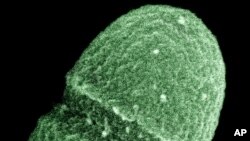U.S. researchers have found a link between intestinal bacteria and the effectiveness of the flu vaccine. And the finding could have important implications for how vaccines are given.
Our intestines are full of bacteria; they help us digest our food. But scientists are starting to learn how important these microbes can be in ways that might be surprising.
New research from Emory University in Atlanta. Professor Bali Pulendran, Ph.D., and his colleagues gave the influenza vaccine to laboratory mice. Some of the mice also got an antibiotic to kill off most of the microbes in their intestines.
"And what we saw was a very substantial drop in the antibody response to flu vaccination in mice that had been depleted of their microbiota with antibiotic treatment," Pulendran said in a telephone interview.
The mice with normal bacteria in their intestines, in other words, would seem to be better protected against the flu than mice whose bacteria were killed off with antibiotics.
This was the case not just with the flu vaccine, but also with an inactivated polio vaccine. The state of intestinal bacteria appeared to make no difference in the effectiveness of other vaccines, though, including the yellow fever vaccine and vaccines containing adjuvants, which are added to boost immunity.
This study involved laboratory animals, but Pulendran said his team is very excited and anxious to know whether such a mechanism is relevant in people. "And as such, we are designing some studies in humans that would try and address this problem."
If the relationship between intestinal bacteria and vaccine effectiveness does hold in humans, it has some interesting implications. For example, the microbe population can vary by geography. It definitely varies by age; children under age two are still developing their gut bacteria.
"Within the first two years of life, children get vaccines," he observed. "I think an important question that deserves to be looked at experimentally is if theres any correlation or link between the composition of microbiota in infants and immunity to vaccinations."
If the animal studies are replicated in human tests, it may affect how and when people get vaccinations.
The study by Bali Pulendran and his colleagues is published in the journal Immunity.










